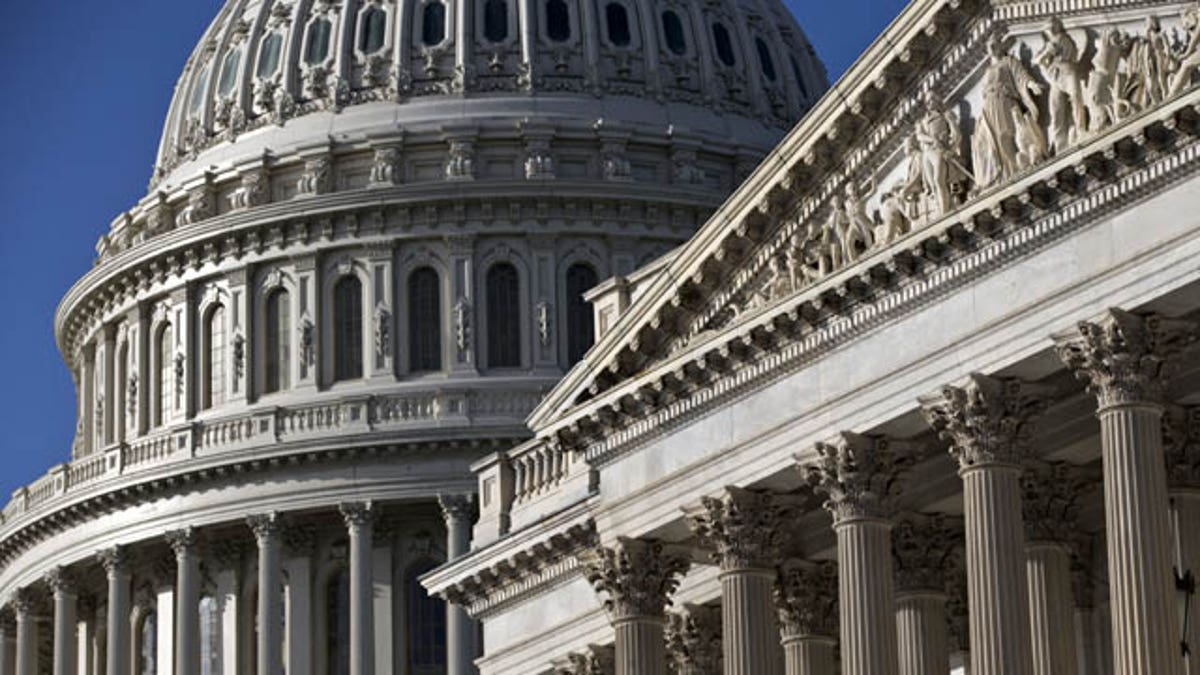
October 14, 2013: The Senate, right, and the Capitol Dome are seen in Washington Monday. (AP Photo/J. Scott Applewhite)
With Senate leaders crafting a new budget plan, perhaps the greatest nemesis of all is the calendar.
Congress can move at lightning speed when it wants to. But it may even be too late despite the potential for alacrity. By nature, Senate rules are designed to taper the pace of legislation. The rules favor the rights of just one or a handful of senators over the demands of the majority, which may otherwise wish to accelerate things.
This is why Congress may have already overshot the debt limit when it comes to the clock. Time may have already expired.
What’s unclear right now is whether Sens. Ted Cruz, R-Texas, Mike Lee, R-Utah, or others intend to filibuster bringing a potential agreement to the floor or wrapping up debate on it. They could filibuster the plan in two ways. One method is a “talking” filibuster where senators seize the floor for hours, preventing final action on the measure. The other option is by simply objecting to various “unanimous consent” requests other senators may make to expedite the process. If the Senate secures the “unanimous consent” of all members, it may proceed to a given bill or even pass it on the spot. But a sole objection could stop the Senate cold.
A complete set of objections and other filibuster schemes could require the Senate to run a gamut of parliamentary hurdles which could propel this into the weekend. That means the federal government could have long broached the debt limit even before the Senate finished the bill – let alone allowed the House to act.
The threat of such filibusters could dictate how the Senate even entertains the final deal on the floor once it’s converted into legislative language.
For starters, the Senate can’t just go write its own bill. Undoubtedly, this prospective measure will hold revenue implications. Article I, Section 7 of the Constitution says that “all bills for raising revenue shall originate in the House of Representatives.” But there’s a way to get around that requirement. Since the partial government shutdown started, the House has churned through a number of spending bills to fund portions of federal operations. The Senate hasn’t acted on any of them. All the Senate must do is take one of those measures, strip the legislation down to its studs, regardless of intent, and slap the text of the new bill inside. That satisfies the constitutional requirement that such measures “originate in the House of Representatives.” The Constitution is silent on the “content” of the bill.
Now things get tricky. Garden variety bills are subject to two possible filibusters. Senators may object to the majority leader even bringing a certain measure to the floor. They may also object to finishing work on it. But there’s a way around those filibusters. It’s called invoking “cloture.” If the Senate invokes cloture by ringing up 60 yea votes, it can clear the first filibuster and proceed to debate on the bill. The Senate may also invoke cloture and advance to a final vote if it scores a second round of 60 yea votes.
Still, this is a cumbersome process which consumes days. And if Cruz or others elect to filibuster at either or both points (starting the debate and halting the debate), then conceivably they will have pushed this well past Thursday, devouring enough time to hit the weekend.
The question to filibuster or not to filibuster is a conundrum facing Cruz, Lee and others. Cruz went for the jugular a few weeks ago, holding forth for more than 21 hours on the Senate floor without a break in what was technically not a filibuster. But the Texas Republican successfully latched the effort to fund the government to killing money tailored for ObamaCare. One could argue Cruz must filibuster if he’s to hold firm to his principals this round. But this scenario is fraught with peril. If Cruz or someone else does filibuster and keep the agreement at bay past Thursday, then many on Capitol Hill are arguing that that Cruz owns any possible default, credit downgrade or other fiscal consequence hurled at the United States Treasury.
Still, there’s a way for the Senate to sidestep a filibuster altogether. But it requires some assistance from the House.
The House of Representatives is now in possession of the old interim funding bill (known as a “CR” or “Continuing Resolution” in Congress-ese). It bounced back and forth between both chambers a number of times in late September, right before the government closed. This piece of legislation is now considered a “message between two houses.” It’s evolved into a unique parliamentary vehicle which both the House and Senate have dealt with on multiple occasions. It’s now “privileged” and can’t be filibustered at any point. Inserting the language of the Senate agreement into this elite congressional measure could certainly hasten the process. But it’s more complicated than that. First, the Senate needs the House to send the message back. The House doesn’t even need to do anything very special to it. It could simply send a “message” over to the Senate which could say about anything. It could say that the House dislikes wearing green on Thursday, or whatever. But the House needs to kick the message back to the Senate.
But don’t count on that happening. A senior House Republican aide indicated it was unlikely the House would do anything to ease the process for the Senate.
But there’s another, uncharted gambit the Senate could employ to fast-track the process.
Earlier this year, the Senate slightly tweaked the chamber’s filibuster rules. This is called “bipartisan cloture.” When filing a cloture petition, it’s necessary for the leader to get the signatures of 16 senators. The vote actually requires 60 yeas. But the structure of the cloture petition is different. The majority and minority leaders must sign the petition and cobble together a bipartisan group of 14 senators from both bodies. Most cloture petitions have to sit for two nights to “ripen” before the Senate may consider them. But this one only entails one night. Under conventional cloture rules, opponents of stopping debate get 30 hours once cloture is invoked. But under “bipartisan cloture,” the Senate can then skip immediately to the bill or a final vote.
“Bipartisan cloture” is brand new. It’s a byproduct of efforts earlier this year to curb some filibusters. And as a result, it’s never been used. Deploying “bipartisan cloture” could certainly hasten the process, potentially lopping off a day or two from the process.
And it would be precedent setting.




